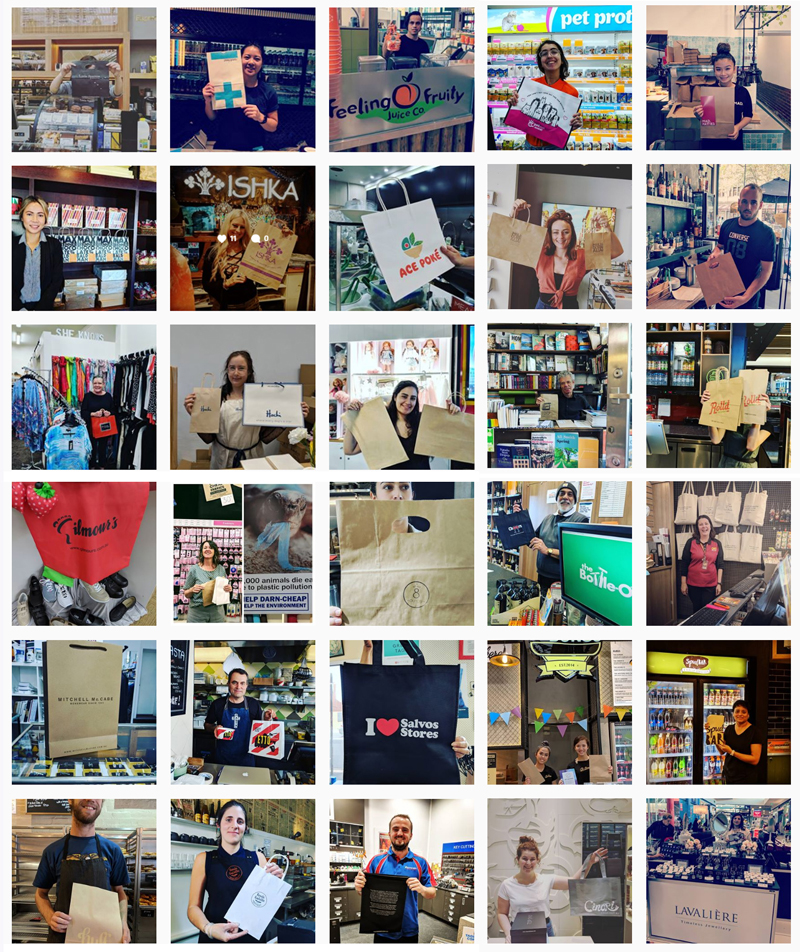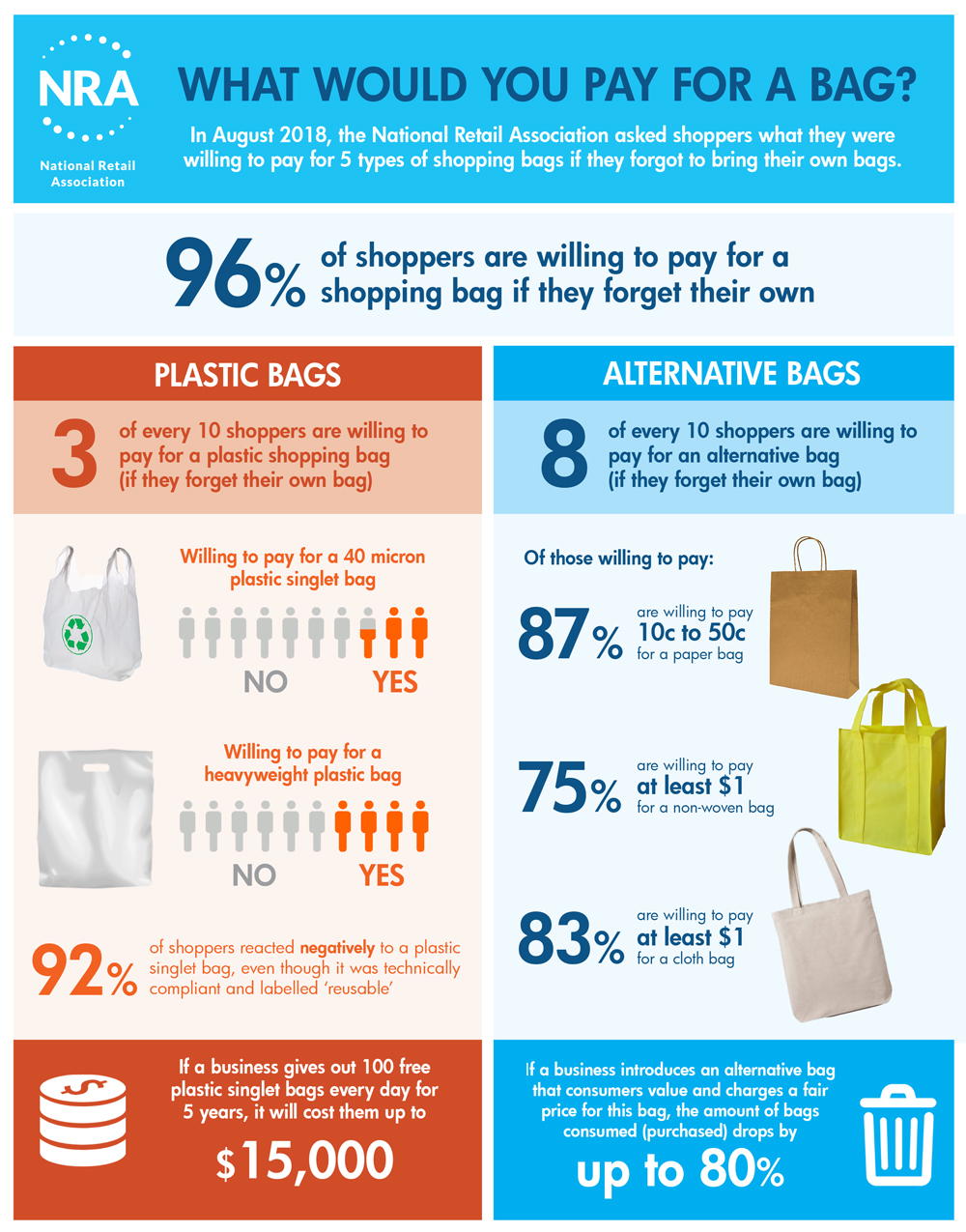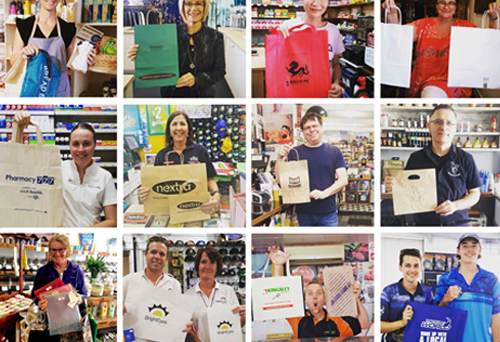RETAILER ADVICE
The Victorian bag ban applies to ALL businesses that sell goods.
This includes supermarkets, greengrocers, bakeries, pharmacies, clothes stores, restaurants, cafes, markets, food outlets, and many more... including online sales.
All businesses should carefully weigh their options and consider what retailers in other states have learnt, even if you currently use a legal plastic bag.
The NRA has assisted thousands of businesses across Australia in managing bag bans, and the following advice is based on real-world, Australian retailer experiences.

MANAGING THE BAN
Weighing up alternatives
Each business has unique needs and costs, and you should weigh up the best long-term option for your business.
Even if your bags are technically legal, there is increasing impetus and support for businesses choosing more sustainable solutions.
ASSESS YOUR NEEDS
Some of the things to consider when weighing up alternatives are:
- Do you need to offer a bag at all? How many customers need a bag currently?
- What size and weight are your products?
- Will you need multiple bag sizes and options?
- How reusable are they (i.e. care, longevity, cleanliness)?
- Are they recyclable at the end of their useful life?
- What option aligns with your brand (i.e. quality, image, country of origin, eco status)?
- Will you brand the bags? Can we add value to our brand and marketing efforts with our bags?
- Do your bags need to meet food safety standards ie. will they come into contact with foodstuffs?
- Do you need handles? How strong must these be?
- How much do your ideal alternative bags cost?
- Would increased costs per unit be compensated by people taking less?
- What would consumers be prepared to pay for alternative bags?
ALTERNATIVE BAGS
The following lists the most common alternative bags available, and some of the pros and cons of each.
1. No bag at all
- First consider whether you really need to provide a bag. If most of your customers purchase only a few small items, park near your store, or bring their own bags or trolley, then you might not need to offer bags anymore. You may also be able to use free alternatives such as reusing stock boxes.
- You are not required to provide customers with a bag and the ban presents an opportunity to assess whether you really need to offer bags at all.
- Retailers in states with existing bag bans report up to 90% decrease in the volume of bags they now provide, and this is important to consider when weighing up more sustainable alternatives, comparing prices and ordering new stock.
- Assess how many customers request carry bags, how many bags you use each day and whether there is an alternative like reusing stock boxes.
- Some businesses can reduce costs substantially just by ceasing to offer bags.
- If you have previously offered bags and plan to cease this, you should inform your customers in advance to avoid issues.
2. Calico/Fabric reusable bags
- fabric shopping bags, often made of calico, hessian, cotton or bamboo
- tend to be more expensive than other options ($1-$5 cost)
- statement branding and patterns are popular, creating higher perceived value
- tend to be the most durable - used by consumers for longer periods and less likely to be thrown out
- The NRA found that consumers are willing to pay on average $2 to $5 for a quality fabric bag.
- You may also be able to arrange Boomerang Bags for your store. Volunteers from all walks of life get together to make reusable ‘boomerang bags’ using recycled materials, as a means to provide a sustainable alternative to plastic bags. The bags are given away to friends, family, colleagues, bagless strangers and so on, as a plastic bag alternative that can be used and reused, or passed on to others in need. Read more about Boomerang Bags >
2. Cardboard bags
- often used by department stores, fashion boutiques and jewellery stores
- may have cut-out, rope, ribbon or plastic handles
- vary in weight, size and quality
- tend to be considered higher quality or ‘premium’ by customers
- provide high quality branding opportunities but do cost more than most other alternatives
- customers are not familiar with being charged for these types of bags so retailers usually incorporate the cost of the bag into a product’s price
- generally reusable and recyclable (try to make all parts of the bag are recyclable eg. handles)
3. Paper bags
- paper bags are used by many retailers including pharmacies, newsagents, bakeries, butchers, food outlets and even UberEats
- can be flat or have fold-out bases
- can have handles or not
- recent advancements mean paper bags can be stronger than plastic bags, even for hot or wet items
- cost-effective compared to other alternative bags
- can be raw or coloured
- can be made from recycled paper
- branding can be printed or stamped on the bags at low cost
- easily recycled
- retailers should investigate the accreditations of suppliers to ensure paper bags are made from sustainable timber sources
- The NRA has found that customers are prepared to pay on average 10c to 50c for a medium paper bag.
4. Reusable non-woven bags
- often called ‘green’ bags, these are made from a plastic that looks like fabric
- commonly used by supermarkets
- includes variations – some have a plastic insert base, some are adapted to cooler bags
- simple branding can be printed on the bag
- consumers are already familiar with the reusable nature of these bags
- consumers already expect to pay a small fee ($1 to $2) for these bags
5. Heavyweight plastic bags
- usually more than 50 microns thick
- most commonly used by department stores, fashion boutiques and supermarkets
- come in various sizes but most popular for large items or large basket counts
- branding is printed on the plastic pre-production
- reusable though this can depend on the size, brand popularity and durability
- recyclable at soft plastic recyclers
- some retailers provide these bags free to the customer but consumers have also show willingness to pay a small amount (eg. 15c) per reusable plastic bag
- may not be a long-term solution as pressure to reduce the use of plastic is expected to continue
- Note: use recycled content where possible
Other options
- there are many creative, eye-catching options
- some retailers have chosen to make a statement with their bags and packaging, aligning this with their brand
- some retailers have decided to add bags as a high volume product line that doubles as branding
- there is growing popularity for reusable bags that fold or scrunch up so that they are easily slipped into a handbag or glovebox. This may present an opportunity for retailers to sell these bags.
Questions to ask your supplier >
You can contact the NRA's hotline (1800 817 723) if you are unsure about the best alternative bag for your business.
If you decide to use a plastic shopping bag:
- If you decide that you need plastic bags, we’d recommend going for a heavyweight, truly reusable plastic bags that are 50 microns or above, ideally made with 80% recycled content.
- Ask your bag supplier to provide written evidence of the bag’s minimum thickness in microns (µm). Specify that you need evidence of the minimum thickness not an average thickness as plastic can be inconsistent. If your supplier can only provide an average thickness then we recommend choosing a thicker or non-plastic bag to allow for any variation.
Questions to ask your supplier >
Note: Fines apply to suppliers if they provide false or misleading information (or withhold info) about banned bags.
BAGS TO AVOID
The NRA does NOT recommend that retailers use plastic shopping bags close to the minimum thickness as your business could be exposed to substantial risks such as:
- inconsistent thicknesses across the bag could risk non-compliance
- having to defend the bags because they appear too similar to the one it replaced
- missed opportunity to reduce cost burdens as consumers are more willing to pay for sustainable options
- consumer complaints (96% of submissions to Government were in favour of a ban - strong indication of consumer preference)
Writing on the bag or carton, such as “Bag Ban Approved” or claims of compliance, are not a guarantee that the bags are compliant in Victoria. No plastic bag has been officially approved.
See what other retailers are using >
Questions to ask your supplier >>
You can contact the NRA's hotline (1800 817 723) if you are unsure about the best alternative bag for your business
If you decide to offer bags of some kind, it is your choice whether to introduce bag fees.
- Many retailers across Victoria have introduced small, reasonable fees for the more sustainable bags they offer. This has proved to be a highly successful step in not only reducing costs on business, but in reducing the volume of bags consumed.
- Retailers in other states report up to 90% drop in bag consumption after they introduced small bag fees so we’d urge you to take this into account when considering the volume you will need.
- You should also notify and educate your customers ahead of introducing bag fees so they are well-prepared and accepting of the change.
- Please make use of the free signage available to download and print for your store here>
- We must emphasize that you cannot supply banned bags even with a bag fee.
Benefits of introducing bag fees:
- Reduce increased costs - More sustainable bags are more expensive than lightweight plastic bags and most businesses cannot afford to give these away and absorb the cost.
- Less changes to POS - Instead of having to increase the price of every product to cover the increased costs, retailers just need to add a few bags as new product lines.
- Customer perception - There is ample evidence that shoppers are now willing to pay a small fee for bags if they forget their own.
- Customers have a choice - Customers can save money if they bring their own bag, rather than every customer having to pay a higher product price.
- Drop in bag volume - When fees are introduced alongside a ban, retailers around Australia have witnessed up to a 90% drop in the number of bags they use, as more consumers remember their own bags or refuse a bag for small purchases. This is good news for retailers, consumers and the environment as less bags need to be produced.
Challenges of introducing bag fees:
- Transition issues - Some customers are likely to complain during the transition period if they feel they were not given adequate notice, however experiences in other states indicate the percentage of customer complaints is quite small and short-lasting.
- POS changes - Bags will need to have a barcode or be entered into your POS system.
- Expectations in your category - Bag fees don't fit every retail category eg. a free quality bag is still largely expected in high-end fashion or jewellery.
Some retailers choose to use a combination of free and charged bags. For example, many pharmacies, takeaway food outlets and cafes provide small paper bags free-of-charge and then offer a range of larger reusable bags at a fair price.
What's a fair price for a bag?
Bag fees should be fair and in line with industry standards. The NRA surveyed consumers and found that consumers are more willing to pay for paper, jute, hessian and cloth bags, but are reluctant to pay for plastic bags of any thickness.
Consumers are particularly reluctant to pay for a singlet-style plastic bag which looks similar to a banned bag.
Please note: retailers cannot supply banned plastic bags from November 2019 – regardless of whether they are free or charged.
.
The ban was announced in 2018 and all retailers and suppliers should have exhausted stock of unused banned bags by 31 October 2019, as compensation is not available for unused stock.
- If your existing plastic shopping bags are banned bags, you should cease supplying these to customers immediately.
- The law applies when you provide these to customers, even if you purchased the bags awhile ago.
- If you purchased the bags recently, we recommend contacting your supplier and discussing whether a refund or exchange is possible to retain your business.
- Note: Penalties apply to a retailer, wholesaler or manufacturer of plastic bags who, by act or omission, provides information that the person knows, or reasonably out to know, is false or misleading about banned or exempt bags.
- If refund/exchange/credit is not possible, and you only have a small amount of stock leftover, you may want to use these as bin-liners or for stockroom purposes.
- Finally, if you have a large amount of unusable stock, contact a local soft plastics recycler like REDcycle to arrange collection and recycling. Some bag suppliers are offering credit or exchange for unused bag stock.
.
Please note: the advice provided on this website is designed to assist retailers in understanding the ban and weighing up options but is by no means exhaustive. Each retail business should assess and make decisions based on their own advice and situation.

